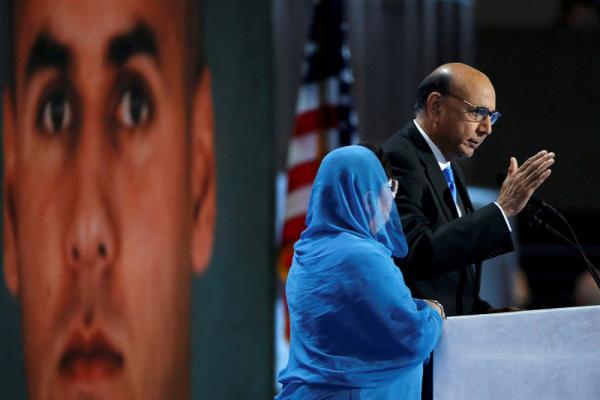When Donald Trump disparaged the parents of fallen soldier Army Capt. Humayun Khan, he didn’t just pick a fight with the Khans. He now faces the ire of hundreds of Muslim American women.
It started when Trump responded to the Khans’ appearance at the Democratic National Convention on July 28.
During that appearance, Humayun Khan’s mother, Ghazala Khan, stood beside her husband silently as he criticized Trump. In an interview with ABC News, Republican presidential nominee Donald Trump suggested Ghazala Khan was not permitted to speak because of her religion.
“If you look at his wife, she was standing there,” said Trump. “She had nothing to say…maybe she wasn’t allowed to have anything to say. You tell me.”
Khan said she declined to speak because she was emotional over the loss of her son, who died in 2004 in Iraq.
“Because without saying a thing, all the world, all America, felt my pain. I am a Gold Star mother. Whoever saw me felt me in their heart,” she wrote in the Washington Post. “Walking onto the convention stage, with a huge picture of my son behind me, I could hardly control myself. What mother could?”
Now, Muslim women around the country — lawyers, entrepreneurs, teachers, activists, artists, mothers and students — have joined on social media to address Trump’s comments, as well as the popular notion that Islam oppresses women.
Using the hashtag #CanYouHearUsNow, Muslim women clapped back at Trump by showing how loud their voices are and have been.
Muslim women "not allowed to speak?" I gave a @TEDTalks and got a standing ovation. #CanYouHearUsNow https://t.co/iggExDBXzD
— Dalia Mogahed (@DMogahed) August 1, 2016
I was a national surrogate for @berniesanders spreading a message of respect & equality for all. #CanYouHearUsNow pic.twitter.com/bfRjoMwQWE
— Linda Sarsour (@lsarsour) August 1, 2016
The Council on American-Islamic Relations has pushed the campaign as well, calling on Muslim women to join the Twitter storm by “demanding that Trump apologize for disparaging Ghazala Khan” and “sharing the various ways they speak out every day.”
“As the leader of America’s largest Muslim civil rights organization, I urge Donald Trump to apologize for his shameful remarks disparaging a Muslim Gold Star family and for his repeated use and promotion of anti-Muslim stereotypes,” CAIR board chair Roula Allouch said in a statement. “Just as Donald Trump must apologize for his un-American remarks, Republican Party leaders must finally repudiate their candidate’s divisive rhetoric.”
.@realDonaldTrump This is me, giving a talk at @Georgetown. Do I look oppressed to you? #CanYouHearUsNow pic.twitter.com/NVVMJDbnlJ
— Rim-Sarah Alouane (@RimSarah) August 1, 2016
Please don't project what goes on in your own household onto us! @realDonaldTrump #CanYouHearUsNow pic.twitter.com/61IfzInDMr
— Malika Dahir (@MalikaDee33) August 1, 2016
I began an online publication for voices to be heard and organized a peaceful student protest. #CanYouHearUsNow pic.twitter.com/xWEHXMcI4z
— Azanta (@athakur98) August 1, 2016
Prominent Muslim American women like Arab American Association of New York director Linda Sarsour, social activist Hind Makki, Institute for Social Police and Understanding research director Dalia Mogahed have joined in, as well as groups like the Muslim Public Affairs Council.
“Donald Trump needs to move his understanding of Islam and Muslims beyond the stereotypes,” Rabiah Ahmed, MPAC media director, said. “Our campaign is one way for us to showcase who we are and what we stand for.”
Trump has previously called for a “total and complete” ban on Muslim immigration to the U.S.
“When I think of Muslim women, I think of all the beautiful women who are working hard everyday to spread good and change the world for better,” Fatima Salman, executive director of the Muslim Student Association National and ISNA representative, said in a statement. “This campaign is designed to show Donald Trump and the rest of America this reality.”
Got something to say about what you're reading? We value your feedback!
